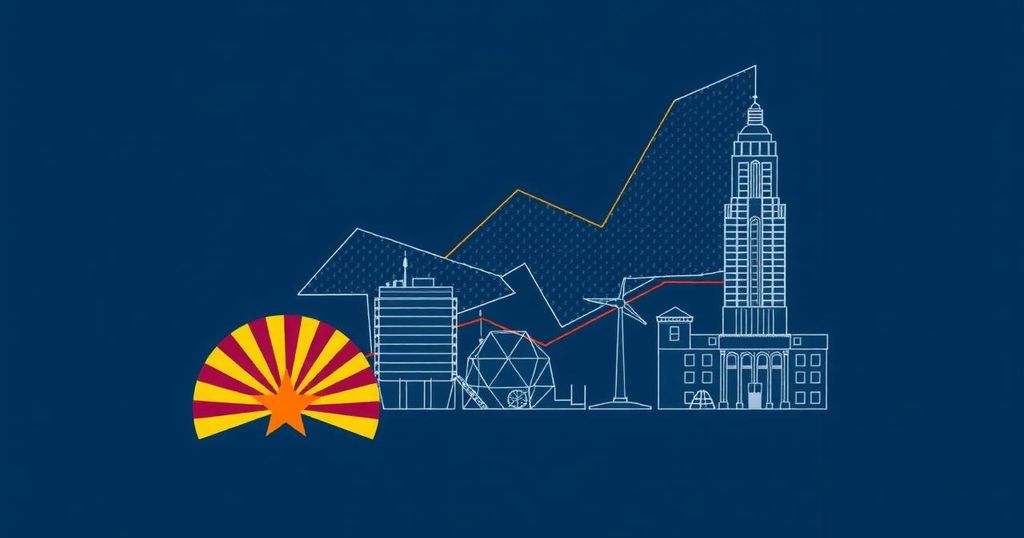Republican Ascendancy in Arizona: Implications for Governance and Society

Recent election results demonstrate a notable Republican consolidation in Arizona, with Donald Trump likely reclaiming the state and strong Republican victories in local offices. Ruben Gallego’s potential election as the first Hispanic senator from Arizona could provide a counterbalance. Nationally, the GOP regains power, raising concerns about unchecked political agendas. Legislative gridlock seems probable in Arizona, emphasizing the need for non-partisan judicial integrity and public safety priorities.
The recent election results signify a notable consolidation of Republican influence in Arizona, as the state appears to be leaning red. While results are still being finalized, Donald Trump is poised to reclaim Arizona, a state he narrowly lost in 2020, signifying a shift in voter sentiment. Although Democrat Ruben Gallego is likely to secure a seat in the U.S. Senate, Republicans have succeeded in clinching all Arizona Corporation Commission positions and most roles in Maricopa County, emphasizing their strengthened grip on local governance. Nationwide, Donald Trump’s surprising resurgence has permitted Republicans to regain control of the U.S. Senate while maintaining a tenuous hold on the House. This outcome intensifies Republican authority at both federal and state levels, with the party holding 27 governorships and commanding 46% of state legislatures, as reported by the National Conference of State Legislatures. Ruben Gallego, should he ultimately triumph, will herald a historic moment for Arizona as the first Hispanic senator from the state. His candidacy symbolizes progress as Hispanics constitute approximately one-third of Arizona’s populace. Gallego’s lead against Republican Kari Lake could mark a shift back towards Democratic representation, given that U.S. Sen. Mark Kelly continues to back him in this pursuit. In contrast, Republicans’ return to the U.S. Senate may complicate the legislative landscape. Democrats’ only recourse to counter Trump’s agenda is regaining control of the House, where they are currently failing to secure enough seats for full control. Furthermore, the possibility of a trifecta—Republicans controlling the presidency and both Congressional chambers—could yield significant implications for power concentration and potential policy shifts, particularly towards consolidating federal authority. Arizona’s legislative dynamics suggest potential gridlock, as Republicans have managed to maintain their positions within the state legislature. If they solidify control, it is likely that few compromises will be reached between opposition parties, thus restricting effective governance. Past initiatives aiming for a broad power reassessment in the Arizona Legislature face substantial barriers, reducing the likelihood of meaningful bipartisan collaboration. Arizonans demonstrated a strong commitment to protecting the judiciary by voting to retain two Supreme Court justices, reflecting a desire for non-partisan legal integrity. This decision underlines the importance of maintaining a judiciary unencumbered by political influence, ensuring stability within Arizona’s legal framework as voters aimed to uphold true merit selection. Additionally, public safety emerged as a focal point for Arizona voters, as several propositions to enhance safety measures encountered readiness for support. However, proposals aimed at significant electoral reforms did not succeed, indicating a preference by constituents for maintaining the status quo regarding election processes.
The political dynamics in Arizona have undergone significant changes following recent election results, where Republican candidates have made substantial gains across various levels of governance. The outcome seems to indicate a shift in voter preferences, particularly influenced by Donald Trump’s resurgence as a leading figure within the party. Concurrently, the candidacy of Ruben Gallego reflects an important cultural milestone within Arizona’s political landscape, while public safety issues dominate local agendas as residents express various priorities through ballot propositions.
In summary, the Republican Party has effectively bolstered its influence within Arizona, signifying a pivotal shift in state politics that reflects broader national trends. The potential historic rise of Ruben Gallego could counterbalance this trend at the federal level. Meanwhile, the interplay between legislative control and public sentiment regarding judiciary independence and safety initiatives highlights the complexity of Arizona’s political landscape. Therefore, the implications of these shifts necessitate careful consideration moving forward.
Original Source: www.azcentral.com







